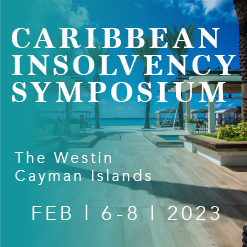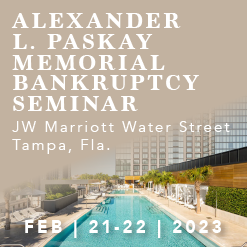| |
| |
| vol 18, num 1 | January 2023 |
| |
|
|
| |
|
|
|
|
|
| |
| Co-Chairs Corner |
| It is hard to believe how quickly 2022 has flown by. We wish you and your family a healthy, happy and prosperous new year filled, hopefully, with some international travels. The International Committee has indeed been busy; keep reading to hear all the amazing things we have been up to!!!
First Annual ABI International Matter of the Year Award
The committee selected In re LATAM Airlines Group S.A., et al., as the winner of the First Annual ABI International Matter of the Year Award. The award is given to a matter that (1) involved the U.S. and one or more other jurisdictions; (2) resulted in the completion of a unique, strategic or challenging international transaction or litigation; and (3) was of international legal significance and impact in relation to the distressed/insolvency industry. Additionally, the committee selected In re Luckin Coffee Inc. for an Honorable Mention. Both awards were presented at the Cross-Border Insolvency Program on Nov. 14, 2022, at the New York offices of Blank Rome LLP. Check out the summary of these two cases, as well as the conference, in this newsletter.
Winter Leadership Conference
The International Committee teamed up with Asset Sales Committee to put on a panel at the Winter Leadership Conference titled, “Asset Recoveries in Foreign Lands.” This panel discussed some of the more interesting aspects of the asset-recovery process, specifically as it relates to locating foreign assets (i.e., Russian yachts). |
| |
|
|
|
|
| |
|
| |
| Toward a New DIP Financing Regime Under European Restructuring Plans: Views from Spain |
| The EU Directive on restructuring and insolvency has imposed an obligation to Member States to introduce relevant changes in their legal regimes on restructuring plans, which can be implemented even if the entity is in “the likelihood of insolvency.” The purpose of the EU Directive is to encourage companies to address insolvency problems at a very early stage so they avoid one of the effects of formal insolvency proceedings: the social stigma, which, unfortunately, is still common in European countries.
In accordance with article 288 of the Treaty of the Functioning of the European Union, directives in the EU “shall be binding, as to the result to be achieved, upon each Member State to which it is addressed, but shall leave to the national authorities the choice of form and methods.” Thus, as opposed to European Regulations (such as the European Insolvency Regulation), the exact specific solution and wording will depend on national instruments and will differ within each EU Member State.
|
| |
|
|
|
|
| |
|
| |
| Creditors’ Possibility of Recovering Goods from Bankrupt Debtors Under Insolvency Proceedings: An Overview of U.S. and Mexican Insolvency Laws |
| Mexico’s insolvency law, “Ley de Concursos Mercantiles” (LCM), provides for a “separation action” that gives the right to legitimate owners of goods in possession of debtors who file for bankruptcy to recover them, as long as such goods are identifiable and their ownership has not been transferred by a definitive and irrevocable legal title. This includes goods acquired by the bankrupt on credit and other assets in their possession as a result of a lease agreement, deposit, usufruct or similar. Articles 70 and 71 of LCM set forth a specific and detailed list of cases in which this action proceeds and the requirements to be met for its
applicability.
Despite the fact that articles 70 and 71 of the LCM provide a catalog of cases in which the separation action applies, as well as the requirements to be fulfilled, some Mexican federal courts have developed judicial precedents changing the meaning of such an action, as well as its usefulness. They have construed the theory of the separation action as being limited by Article 1 of Mexico’s Business Reorganizations Law, which sets out the “spirit” of said statute: that it is in the public interest to preserve companies that file for bankruptcy, and it avoids that generalized noncompliance with payment obligations may put at risk the viability of such companies and of the others with which they maintain a business relationship.
|
| |
|
|
|
|
| |
|
| |
| Insolvency Reforms to Nigeria’s Companies and Allied Matters Act 2020 |
| On Friday, Aug. 7, 2020, President Muhammadu Buhari assented to the Companies and Allied Matters Bill, recently passed by the National Assembly of the Federal Republic of Nigeria. The bill introduced significant insolvency reforms, including procedures for Administration and Company Voluntary Arrangements, as well as regulations for Insolvency Professionals. The reforms were introduced to align the jurisdiction with international best practices.
Administration
The Companies and Allied Matters Act (CAMA/Act) introduced the concept of administration to the jurisdiction. The Act empowers the administrator to do all such things as may be necessary for the management of the affairs, business and property of a company. The Act further acknowledges that an administration may have a cross-border element and essentially provides that where such is the case, an application needs to be made to the Court for approval.
|
| |
|
|
|
|
| |
|
| |
| Revisiting the Rule in Gibbs following Rare Earth and Modern Land |
| There has been growing debate in recent years over the continued relevance of the common law rule in Antony Gibbs & Sons v La Societe Industrielle et Commerciale des Metaux (1890) LR 25 QBD 399 (the “Gibbs Principle”). The Gibbs Principle basically means that where a contract is governed by the law of a particular country, it cannot be discharged or compromised under the insolvency law of another country — unless the creditor has submitted to that other jurisdiction.
The competing approaches to the application of the Gibbs Principle were highlighted in the conflicting decisions delivered this year by Mr. Justice Harris of the High Court of the Hong Kong Special Administrative Region in Rare Earth and U.S. Bankruptcy Judge Martin Glenn of the U.S. Bankruptcy Court for the Southern District of New York in Modern Land. This article presents arguments for and against the retention of the Gibbs Principle in today’s practice of cross border insolvency.
Arguments for the Gibbs Principle
The Gibbs Principle is often summarized as meaning, in effect, that an English court will not recognize the discharge of an English law-governed debt in a foreign insolvency proceeding. However, the principle is more nuanced. Taking the English courts as an example, an English court will only recognize the discharge of a debt in a foreign insolvency process if that discharge would be effective under the governing law of the debt. |
| |
|
|
|
|
| |
|
| |
| First Annual ABI International Matter of the Year Award |
| The committee selected In re LATAM Airlines Group S.A., et al., as the winner of the First Annual ABI International Matter of the Year Award. The award is given to a matter that (1) involved the U.S. and one or more other jurisdictions; (2) resulted in the completion of a unique, strategic or challenging international transaction or litigation; and (3) was of international legal significance and impact in relation to the distressed/insolvency industry. Additionally, the committee selected In re Luckin Coffee Inc. for an Honorable Mention. Both awards were presented at the Cross-Border Insolvency Program on Nov. 14, 2022, at
the New York offices of Blank Rome LLP. Check out the summary of these two cases below!
Matter of the Year Summary: LATAM Airlines Group S.A.
Matter of the Year Honorable Mention Summary: Luckin Coffee Inc.
|
| |
| |
|
| |
| NYC Cross-Border Conference Recap |
| After two years of being held virtually, ABI’s in-person Cross-Border Insolvency Program resumed on Nov. 14 in the Blank Rome LLP Conference Center in Manhattan. Thanks go to Evan Zucker and Blank Rome for hosting the conference. After an initial welcome from committee co-chairs Kyle Ortiz (Togut, Segal & Segal) and Evelyn Meltzer (Troutman Pepper), the program ran with four sessions and included the award of the first annual International Matter of the Year for the LATAM transaction, as well as an honorable mention for the Luckin Coffee transaction (details on both are separately
addressed elsewhere in the newsletter). |
| |
|
|
|
|
| |
|
| |
| ABI Holds International Insolvency & Restructuring Symposium in London |
| For the first time since the start of the pandemic, ABI held its annual International Insolvency & Restructuring Symposium in person, returning to London Oct. 13-14. The symposium was held in conjunction with the American College of Bankruptcy, the International Insolvency Institute (III), INSOL, IWIRC and TMA Europe, and featured many of the hottest topics in international restructurings.
Among the issues featured was whether the so-called “Texas two-step” could, and concomitantly should, be exported from the U.S., recent developments in rescue financing, recent developments on the European Directive, the effect of rising interest rates on future restructurings, and ESG issues in restructurings. There was also a panel discussing the legal issues affecting customers and other creditors in the latest cryptocurrency insolvencies cases, including Voyager and Celsius.
|
| |
|
|
|
|
| |
|
| |
| New Member Spotlight |
| The International Committee community continues to grow! We are excited to introduce and welcome the following new members who joined our committee between July and October 2022.
 Harry Lawless, World Bank Group (Washington, D.C.) Harry Lawless, World Bank Group (Washington, D.C.)
Harry is a financial sector specialist with the Insolvency and Debt Resolution team of the World Bank Group, based in Washington, D.C. In this role, Harry has contributed to the provision of research and advice for governments on insolvency and debt-resolution reforms in the context of the COVID-19 pandemic. Harry was a co-author of a chapter of the 2022 World Development Report. He has also contributed to law-reform projects in Africa, Asia and the Caribbean. Prior to joining the World Bank Group in 2021, Harry was a lawyer at Norton Rose Fulbright in Sydney, Australia. Harry holds a Masters in Administrative Law and Policy from the University of Sydney and received his Bachelor of Arts/Law (Hons) in 2016 from the Australian National University. He was admitted to practice as a solicitor in New South Wales in 2017.
 John Gerardi, Boies Schiller Flexner (Washington, D.C.) John Gerardi, Boies Schiller Flexner (Washington, D.C.)
John is an associate in the Washington, D.C., office of Boies Schiller Flexner LLP. John’s practice centers on cross-border disputes and investigations, as well as other high-stakes securities and financial litigation. His practice has touched on matters involving Asia, Europe and South America, where he has gathered substantial experience in complex commercial disputes in both national courts and arbitral forums.
Other Members
- Douglass Barron, Paul Hastings, LLP (New York)
- Lynn Harrison III, Dentons (New York)
- Kevin Mailoux, Borden Ladner Gervais (Montréal, Canada)
- Miles Staglik, CR3 Partners (Los Angeles)
- Ho Wang, University of Scotland (Glasgow, Scotland)
- Leyza Blanco, Sequor Law (Miami)
- Bryan M. Kolitar, Togut Segal & Segal LLP (New York)
- Jeremy Snead, Ogier (London)
- Fabio Weinberg Crocco, Sullivan & Cromwell LLP (New York)
- AnnElyse Scarlett Gains, Gibson, Dunn & Crutcher LLP (Washington, D.C.)
|
| |
| |
|
|
|
|
|
|
|
|
|
| |










 Harry Lawless, World Bank Group (Washington, D.C.)
Harry Lawless, World Bank Group (Washington, D.C.) John Gerardi, Boies Schiller Flexner (Washington, D.C.)
John Gerardi, Boies Schiller Flexner (Washington, D.C.)

